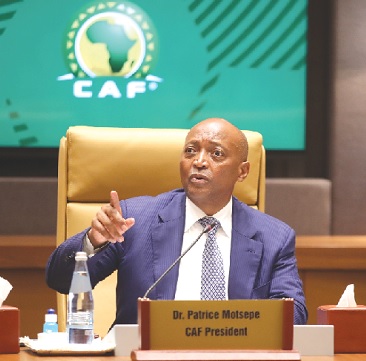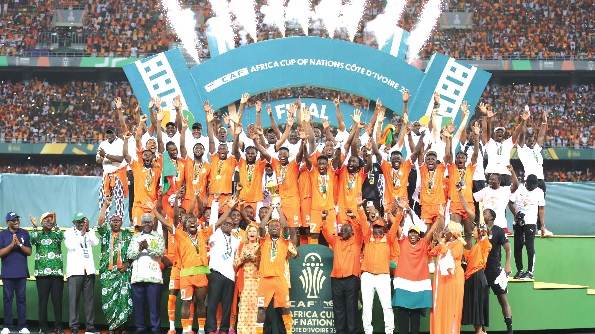
2025 AFCON clobbered by unwanted Club World Cup
THE Confederation of African Football (CAF) announced last Friday that the 2025 Cup of Nations (AFCON) will kick-off in 2025. Which is something, given neither of the past two Cups of Nations were played in the right year.
But it won’t end in 2025, kicking off on 21 December and finishing on 18 January. Yet the truth is, that is probably the least bad option available – and for once it isn’t really CAF’s fault.
This will be the seventh Cup of Nations in a row that has not gone ahead as originally scheduled for a variety of reasons including unrest in Libya, Moroccan panic over an outbreak of Ebola in Guinea, delays in the construction of Camerounian infrastructure, COVID and the Ivorian rainy season. But this is slightly different.
The previous changes were the result of politics, disease and disorganisation – and a weird reluctance to acknowledge an annual meteorological phenomenon. This chaos is almost entirely the result of Fifa’s desire to impose another tournament on the game and the wrangling over football’s calendar.
Back when the majority of players at a Cup of Nations were based in Africa, the tournament was played in the March of even-numbered years. By the late 80s, though, as more and more Africans joined European sides, that began to cause difficulties with clubs reluctant to release players as domestic seasons came to a climax.
From 1992, the Cup of Nations moved to a January start, taking advantage of the pause in the French season over Christmas.
For two decades the schedule remained the same, with Issa Hayatou, the longtime president of CAF, robustly defending the principle that the Cup of Nations should be played every two years.
It is, after all, the biggest source of revenue for the African game, generating far more money than the club competitions and, given how few qualifying slots there are for African nations at the World Cup (not that recent performances have justified more), it was the only way most African countries could experience international competition.
Cote d'Ivoire won the 2023 Africa Cup of Nations on home soil at the start of 2024.
But it came to be realised, particularly after 2010 when South Africa hosted the World Cup, that the Cups of Nations played in World Cup years were diminished.

For the countries who had qualified for the World Cup, there was a sense of it as a warm-up tournament. And perhaps it was not fair on players to expect them to undergo the emotional expenditure of a major tournament twice in six months. So, from 2013, the Cup of Nations was moved to odd-numbered years.
Which worked fine until 2017 when Hayatou was toppled by Ahmad Ahmad, who at that point was an ally of Gianni Infantino. Ahmad came in promising reform and transparency; they always do.
Hayatou had many faults but he was stubborn and cussed and understood FIFA politics.
That he presided over an institution that was dysfunctional and often corrupt is obvious (it’s football, what do you expect?), but on certain fundamentals of the African game he was impressively immovable.
Ahmad called a huge symposium in Rabat to discuss issues facing the African game. It was suggested there that the Cup of Nations should be moved to June-July in odd-numbered years to lessen friction with European clubs.
Which would be a fine idea were it not for the west African rainy season. The 2019 tournament, moved to Egypt because Cameroon’s preparations were behind, was held successfully in June-July.
It was hot, but not unbearably so although with Mediterranean temperatures rising that is not something that can be relied upon.
Covid led to the 2021 Cup of Nations in Cameroun being played in January/February 2022, avoiding the issue. The 2023 Cup of Nations was played in Cote d’Ivoire in January/February this year after somebody finally took note of the average rainfall in Abidjan in June.
But everything seemed set for June/July in Morocco next year. Then Infantino came up with his expanded Club World Cup wheeze and slapped it in the calendar over the Cup of Nations dates.
Whether any of the seven African members of the FIFA Council, who include the usually astute Moroccan Fouzi Lekjaa, objected is unclear.
That tournament may not even go ahead. The players union FIFpro and the World Leagues Association are opposed and less than a year before the scheduled start no stadiums have been booked, no tickets sold and no TV deal agreed.
But CAF can’t take the risk. Initially the thinking was the Cup of Nations could be played in July/August but if the Club World Cup does go ahead that is manifestly unfair on any players expected to play in both (quite apart from those at European clubs, it is likely significant numbers of Egypt’s squad will be drawn from Al-Ahly and South Africa’s from Mamelodi Sundowns).
So, back to the old problem of playing the Cup of Nations in a World Cup year and January/February 2026? That space no longer exists thanks to the expanded Champions League format.
Besides, there is a Fifa regulation that clubs are under no obligation to release players for more than one competition in a year. Which left December 2025/January 2026, (just about) bypassing that regulation on a technicality.
Premier League clubs would lose players from the hectic festive programme, but there are no good solutions. Overseas TV audiences may even go up; it could be that Benin v Togo from Tangier is just the thing with the post-turkey digestif.
But the detail of the solution is arguably less significant than the source of the problem. After the Rabat symposium, African football made a significant change to try to fit in with the world game.
Its reward has been to be undermined by a governing body inventing a new tournament nobody seems to want and trying to ram it into an already packed calendar.
It is always those down the chain who suffer for careless leadership. The game’s elite can shrug; for them the Club World Cup means little more than a pre-season tour mildly inconvenienced.
But this folly leaves African football scrabbling around to find a time to play its tournament, one it desperately needs.
